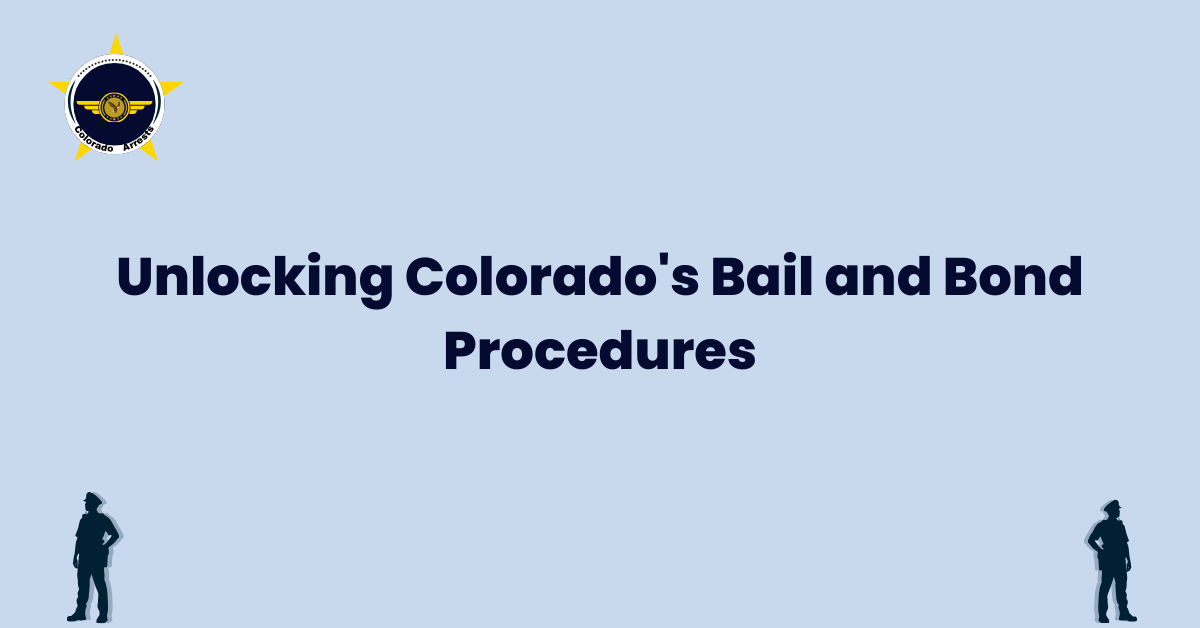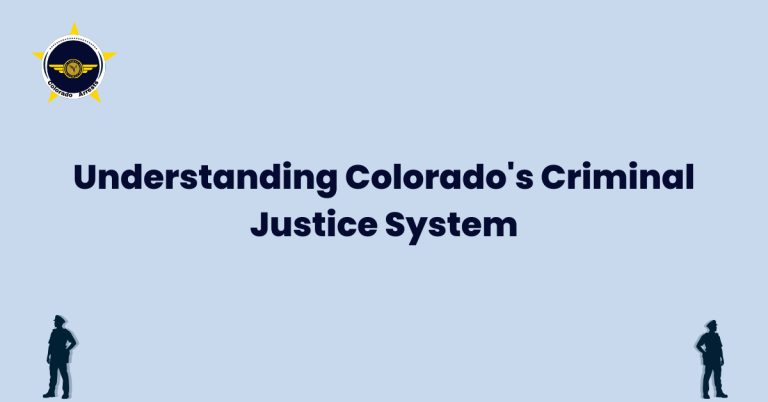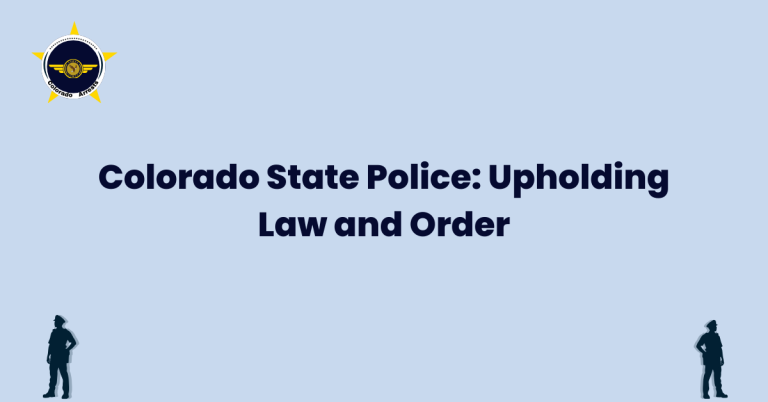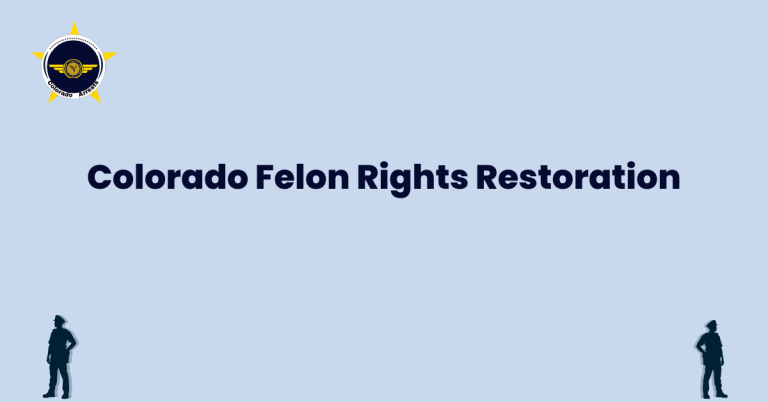Unlocking Colorado’s Bail and Bond Procedures
Colorado, a state known for its stunning landscapes and outdoor adventures, also has a unique set of bail and bond procedures that are important for residents and visitors to understand. Whether you find yourself in a legal situation or simply want to be informed about the state’s judicial system, this introductory guide will provide you with valuable insights.
From the moment you step foot in Colorado, it’s crucial to familiarize yourself with the bail and bond procedures in order to navigate the legal landscape effectively. Understanding the difference between bail and bond, knowing the criteria for eligibility, and being aware of the various types of bonds available will empower you to make informed decisions.
Understanding Bail and Bond Procedures
Colorado, a state known for its stunning landscapes and outdoor adventures, also has a unique set of bail and bond procedures that are important for residents and visitors to understand. Whether you find yourself in a legal situation or simply want to be informed about the state’s judicial system, this introductory guide will provide you with valuable insights.
Familiarize Yourself with the Basics
From the moment you step foot in Colorado, it’s crucial to familiarize yourself with the bail and bond procedures in order to navigate the legal landscape effectively. Understanding the difference between bail and bond, knowing the criteria for eligibility, and being aware of the various types of bonds available will empower you to make informed decisions.
What is Bail?
Bail is a monetary deposit or property that is provided as a guarantee to the court that the defendant will appear for all scheduled court hearings. It serves as a temporary release from custody while the legal process unfolds. The amount of bail is determined by the judge, taking into consideration factors such as the severity of the offense and the defendant’s flight risk.
What is a Bond?
A bond is a financial arrangement made through a bail bondsman or bonding agency. Instead of paying the full bail amount upfront, the defendant pays a percentage, typically 10%, to the bondsman who then provides the full bail amount to the court. The bondsman assumes the responsibility of ensuring the defendant’s appearance in court and may require collateral or a co signer.
Eligibility for Bail and Bond
Not everyone is eligible for bail or bond in Colorado. The judge takes several factors into consideration when deciding whether to grant bail, such as the seriousness of the offense, the defendant’s criminal history, and the likelihood of the defendant fleeing. It’s important to consult with an attorney to understand your specific eligibility for bail or bond.
Types of Bonds in Colorado
Colorado offers several types of bonds, each with its own requirements and conditions. Some common types of bonds include cash bonds, property bonds, and surety bonds. It’s essential to understand the specifics of each type and consult with a knowledgeable professional to determine the most suitable option for your situation.
Benefits of Understanding Bail and Bond Procedures
Having a solid understanding of bail and bond procedures can greatly benefit individuals navigating the Colorado legal system. It allows you to make informed decisions regarding your legal situation, ensures compliance with court requirements, and provides you with peace of mind throughout the process. By familiarizing yourself with these procedures, you are taking an active role in your own legal journey.
FAQs
What is the difference between bail and bond?
Bail refers to the amount of money or property that a defendant must provide to the court as a guarantee that they will appear for their court hearings. Bond, on the other hand, is a written agreement between the defendant, a surety, and the court, which guarantees the defendant’s appearance in court. In simple terms, bail is the actual amount of money or property, while bond is the arrangement made with a bonding company to pay the bail amount if the defendant fails to appear in court.
How is the bail amount determined in Colorado?
In Colorado, the bail amount is determined by a judge based on various factors, including the severity of the crime, the defendant’s criminal history, flight risk, ties to the community, and the likelihood of the defendant appearing in court. The judge takes all these factors into consideration to set a fair and reasonable bail amount.
What happens if I can’t afford to pay the bail amount?
If you’re unable to afford the full bail amount, you have several options. One option is to pay a bail bondsman a percentage of the total bail amount, usually 10%, and they will provide the full bail amount to the court. Another option is to request a bail reduction hearing, where you can present evidence and arguments to the judge to lower the bail amount. Finally, if you cannot afford any bail amount, you may be eligible for a release on your own recognizance, where you are released from custody without having to pay bail.
What are the different types of bonds available in Colorado?
In Colorado, there are various types of bonds available, including cash bonds, surety bonds, property bonds, and personal recognizance bonds. A cash bond requires the full bail amount to be paid in cash. A surety bond involves a bonding company guaranteeing the bail amount. A property bond allows the defendant to use their property as collateral for the bail amount. Finally, a personal recognizance bond is granted based on the defendant’s promise to appear in court without the need for any monetary payment.
Can the bail amount be refunded?
If the defendant appears in court for all required hearings, regardless of the outcome of the case, the bail amount is typically refunded. However, if the defendant fails to appear in court, the bail amount is forfeited and becomes the property of the court. It’s important to comply with all court requirements and not miss any court dates to ensure the return of the bail amount.
What happens if I violate the conditions of my bond?
If you violate the conditions of your bond, such as failing to appear in court or committing another crime while out on bond, the court may issue a warrant for your arrest and revoke your bond. This means you will be taken back into custody, and your bond will be forfeited. It’s crucial to comply with all bond conditions and follow any court orders to avoid these consequences.
Colorado, with its stunning landscapes and outdoor adventures, offers residents and visitors a unique experience. However, it’s important to be informed about the state’s bail and bond procedures to effectively navigate the legal landscape. Understanding the difference between bail and bond, knowing the criteria for eligibility, and being aware of the various types of bonds available will empower you to make informed decisions and ensure a smooth legal process.







